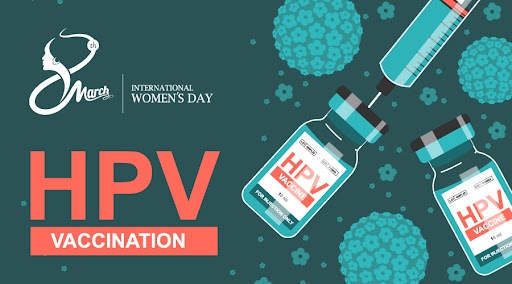

Happy Women’s Day! As we celebrate the progress made towards gender equality and the empowerment of women, it’s important to highlight one of the most significant health issues affecting women worldwide: the Human Papillomavirus (HPV) and the importance of getting vaccinated against it. So, here’s everything you need to know about the HPV vaccine. Also learn how it helps prevent cervical cancer, one of the most common cancers amongst women.
HPV Vaccine for Women
HPV is a common sexually transmitted infection that can cause genital warts and various types of cancers, including cervical, anal, and throat cancer. According to the World Health Organization (WHO), approximately 570,000 women are diagnosed with cervical cancer each year. More than 310,000 women die from the disease annually.
The HPV vaccine is recommended for girls and boys between the ages of 11 and 12 years old. The vaccine is most effective when given before exposure to the virus, which means before a person becomes sexually active. The vaccine works by helping the immune system fight off HPV infections. This reduces the risk of developing HPV-related cancers and genital warts.
Why is the HPV Vaccine Important for Women?
While the HPV vaccine is recommended for both boys and girls, it is especially important for women, as they are more likely to develop cervical cancer. The Centers for Disease Control and Prevention (CDC) recommends that all women receive the vaccine for HPV up to the age of 26. Women who are older than 26 may also benefit from the vaccine if they have not previously been vaccinated and are at increased risk of HPV infection such as those with weakened immune systems or a history of abnormal PAP test results.
The HPV vaccine is important because it can help prevent HPV-related health problems, including cervical cancer. Cervical cancer is the fourth most common cancer among women worldwide and it is responsible for over 300,000 deaths each year. The HPV vaccine can help prevent the types of HPV that are most likely to cause cervical cancer, which means that getting vaccinated can significantly reduce a woman’s risk of developing this deadly disease.
How Does the Vaccine for HPV Work?
The HPV vaccine works by stimulating the body’s immune system to produce antibodies against the virus. These antibodies can then help to protect the body from future HPV infections. The vaccine contains purified proteins from the outer surface of the HPV virus but it does not contain any live virus, which means that it cannot cause an HPV infection.
Who Should Get the Vaccine for HPV?
The HPV vaccine is recommended for young women between the ages of 9 and 26. The vaccine is most effective when given before a person becomes sexually active, so it’s recommended that girls receive the vaccine at age 11 or 12. However, the vaccine can still be given to women up to age 26. It’s also recommended for boys and men up to age 26.
If you’re not sure whether you should get the HPV vaccine, talk to your doctor. Your doctor can help you understand your risk of HPV-related health problems and can recommend whether the vaccine is right for you.
How is the Vaccine for HPV Given?
The HPV vaccine is given as a series of shots, usually over the course of six months. The number of shots needed depends on the age of the person receiving the vaccine. For girls and boys who receive the vaccine at age 11 or 12, two doses are recommended. If the vaccine is given after age 15, three doses are recommended.
It’s important to get all of the recommended doses of the vaccine in order to get the full benefit. If you miss a dose or are late getting a dose, talk to your doctor about how to catch up.
Does HPV Vaccine Have Any Side Effects for Women?
Like every other vaccine, the HPV vaccine too has side effects. The most common side effects that women may experience are mild and involve pain, redness, or swelling at the injection site. Some people may also experience fever, headache, or fatigue. These side effects usually go away on their own within a few days.
In rare cases, the HPV vaccine can cause more serious side effects. These may include an allergic reaction, difficulty breathing, or a rapid heartbeat. If you experience any of these symptoms after receiving the HPV vaccine, seek medical attention immediately.
Is the HPV Vaccine Safe for Women?
Yes, the HPV vaccine is considered safe. It has been extensively studied and has been shown to be highly effective in preventing HPV infection and reducing the incidence of cervical cancer. Like all vaccines, the HPV vaccine is also consistently monitored for safety by the Centers for Disease Control and Prevention (CDC) and the Food and Drug Administration (FDA).
Is the Vaccine for HPV Effective in Preventing Cervical Cancer?
Yes, the HPV vaccine is highly effective in preventing HPV infection and reducing the incidence of cervical cancer. In fact, studies have shown that the vaccine can prevent up to 90% of HPV-related health problems.
Conclusion
The HPV vaccine is an important tool in preventing HPV-related health problems, including cervical cancer. It’s recommended that girls should receive the vaccine at age 11 or 12 but it can still be given up to age 26. The vaccine is safe and effective, and the most common side effects are mild and go away on their own. If you’re a young woman, talk to your doctor about getting the HPV vaccine to protect your health.




